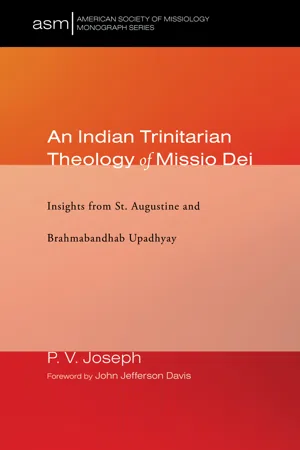![]()
1
Renewal of Trinitarian Theology and Missio Dei: Historical Trajectories
Introduction
The Trinity is arguably the most central and foundational of all the doctrines of the Christian faith. The Trinity, which assumed an important place in the early development of Christian doctrine during the patristic and medieval eras, suffered a significant degree of marginalization during the Enlightenment and post-Enlightenment periods. The resurgence of trinitarian doctrine in the twentieth century was a significant development in the history of Christian theology. This modern renewal and articulation of the doctrine did not confine itself to the traditional interpretation followed in the ancient creeds. There has been a broadening of the horizon of trinitarian doctrine’s implications into wider spheres of ecclesial and social concerns. One such striking development has been the rediscovery of the trinitarian foundation of Christian mission and its integration with the concept of the missio Dei. This new understanding of mission led to a shift from the traditional ecclesiocentric view of mission to a trinitarian-centric approach. This chapter attempts to trace the rebirth of trinitarian theology as well as the development of the idea of the missio Dei that developed alongside the modern trinitarian restoration. The first part of this chapter reviews the trinitarian renewal as presented in the works of selected theologians from major Christian confessions. This study intends to serve as a historical context for the larger objective of this study to bring into conversation the Western and Indian traditions of trinitarian theology with reference to the concept of the missio Dei. The second part of the chapter will examine the expansion of the concept of the missio Dei in its broader trinitarian foundation.
Trinitarian Theology: From the Patristic Period to the Enlightenment
The first five centuries of the Christian Church were foundational for the development of trinitarian theology. Crucial christological foundations for trinitarian doctrine were formulated at Nicea in 325 in response to the christological controversies ignited by Monarchianism, Modalism, and Arianism. The debate set off by the fourth-century Christian heresy of Pneumatomachism (Macedonianism) led to the formulation of the Nicene Creed at the Council of Constantinople in 381, which became the benchmark of trinitarian orthodoxy. After the council, the Synod of Constantinople held in 382 affirmed in its synodical letter the consubstantiality and co-eternity of the Father, the Son, and the Holy Spirit. The Council’s affirmation in the full deity and equality of all the three persons of the Godhead marked a definitive chapter in the history of the development of trinitarian doctrine, which would serve as the norm for the future articulations of the Christian doctrine of God. The doctrine of the Trinity received its classic formulations at the hands of the Cappadocian Fathers, Basil the Great, Gregory of Nyssa, and Gregory of Nazianzus. While the Cappadocians represented primarily the Greek formulation of the doctrine of the Trinity, it was St. Augustine who was most influential in the development of the doctrine of the Trinity in Latin theology.
Trinitarian thought was further developed and expressed in the Tome of Pope Damasus, the Athanasian Creed, and the council of Toledo. The Tome of Pope Damasus issued by Pope Damasus in 382 contains unequivocal affirmation of the deity and equality of the three persons of the Godhead. The Athanasian Creed has exerted a great influence on the doctrine of the Trinity and became the standard for trinitarian orthodoxy in the West. It remarkably summarizes the affirmations of the councils of Nicea (325) Constantinople (381) Ephesus (431) and Chalcedon (451), and asserts the equality and deity of all the persons of the Trinity in the strictest Augustinian form. The teaching of the Athanasian Creed is reflected in the creed of the local council of Toledo (Spain) held in 675 which has one of the clearest statements on the doctrine of the Trinity affirming the deity, equality, and the unity of the persons of the Trinity. The doctrine of the Trinity continued to remain central in Christian thought and received further development through the works of Richard of St. Victor, St. Bonaventure, St. Thomas Aquinas, and the Reformers.
The rise of rationalism and empirical science during the Enlightenment had a great impact on the Christian understanding of the doctrine of the Trinity. Although emphasis on human reason became the hallmark of this period, it was not considered inimical to theology at least in the early phase of the Enlightenment. In fact, human reason was understood to be an aid for the articulation of theology and for the defense of the biblical revelation. During the latter phase of the Enlightenment, reason increasingly became the guiding principle of life and the ultimate arbiter of truth. One of the consequences of this development was the rejection of the belief about revelation and inspiration of the Bible. The doctrine of the Trinity, which hitherto had been grounded firmly in this faith and conviction of the Scripture, was relegated to the realm of the irrational and was regarded as incompatible with modernity. Another major development during this period was the rise of Unitarianism in the...
